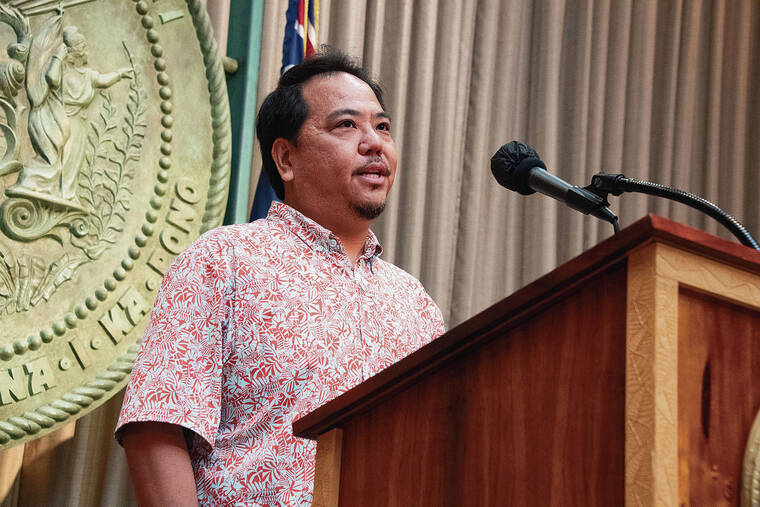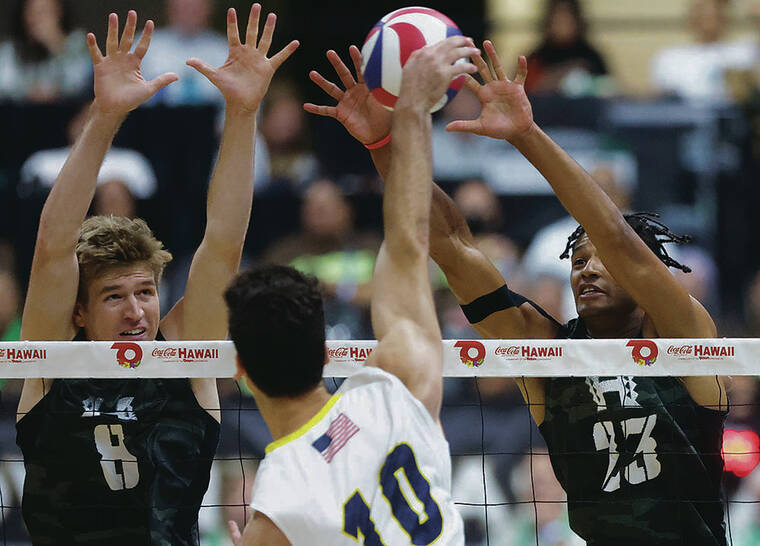Labor pacts for 5,000 Hawaii hotel workers expected soon

CRAIG T. KOJIMA / MAY 5
Cade Watanabe, Local 5 financial secretary-treasurer, said in a statement, “These agreements achieve our major goals — wages that help us get ahead and not just get by.” Watanabe is shown giving remarks at the state Capitol regarding good-governance bills.
UNITE HERE Local 5 expects to settle labor contracts for more than 5,000 hotel workers, or approximately half the union’s membership, by the end of this week with average earnings that keep up with inflation and make up for some past losses — a significant gain that moves the union closer to its rallying cry, “One job should be enough.”
Local 5 hotel workers at the Sheraton Maui, which employs over 300 union members, will vote on a new contract today, and on Thursday workers will vote at the Sheraton Kauai, which employs more than 200 unionized workers.
The votes follow ratification Nov. 4 of a four-year contract between Hilton Hawaiian Village Waikiki Beach Resort and Local 5 workers, which ended a 40-day strike and put into place wage hikes that by contract’s end deliver $10-an-hour, across-the-board pay increases to workers.
Cade Watanabe, Local 5 financial secretary-treasurer, said in a statement: “For 40 days, Hilton Hawaiian Village workers led all of Local 5. Their willingness to step up and strike set a historic new standard for hotel workers, and without their sacrifice we would not have been able to secure similar agreements with Kyo-ya & Marriott.
“These agreements achieve our major goals — wages that help us get ahead and not just get by, job security, and a commitment from our employers to address workload and staffing concerns that have a direct impact on our guests,” he said. “More importantly, hotel workers are proving the power we possess in making our state’s number one industry work — not just for our owners and operators but for us locals too.”
The new standard set by the Hilton Hawaiian Village Local 5 contract matches the new wage increases for UNITE HERE workers in San Diego, who also got about a $10 hourly wage hike over four years.
Don't miss out on what's happening!
Stay in touch with breaking news, as it happens, conveniently in your email inbox. It's FREE!
Paul Brewbaker, principal of TZ Economics, said while there were gains from the standpoint of hotel workers’ real earnings from 2019 to 2022, all that happened was to reverse the erosion that had happened during the 12-17 years preceding the pandemic, from workers’ standpoints.
Brewbaker said a $10-an-hour raise means that “hotel workers over the next four years are going to catch themselves up to whatever extent their contract basically disallowed them from getting an inflation adjustment in their salaries.”
For example, Honolulu Star-Advertiser research shows that housekeepers, who make up the bulk of any hotel’s labor force, prior to the strike made about $28 an hour, which equates to an estimated $65,000 for full-time wages, including some $7,000 in tips. The newly ratified Hilton Hawaiian Village contract, and other Local 5 union contracts that carry “me too” language, increase the average wage for housekeepers to about $38 an hour. The new annual wage would be more than $86,000, including tips.
Brewbaker said the new contract gives housekeepers an average 7.1% increase annually with compounding per year for four years, and 31.7% cumulatively over the four years. In comparison, Brewbaker estimated that bartenders, one of the union’s most lucrative jobs, would get a 3.7% increase annually with compounding per year for four years, and 15.7% cumulatively over the four years.
Under the new contract, bartenders would make about $45 an hour, which equates to more than $153,000 annually including tips. That’s up from $35 an hour, which equates to an annual average of nearly $133,000, including an average of $60,000 in tips.
“To me, getting housekeepers from $66,000 to $86,000 is a much more meaningful adjustment,” Brewbaker said. “If your starting point was $66,000, you have a lot more to worry about than the bartender whose starting point was $133,000. When inflation shows up in food prices, it’s much more burdensome for the person making $66,000. The bartender is not eating any more food than the housekeeper.”
Brewbaker said workers needed to see an increase of at least 3.5% per year of the contract to make up for the inflation of the past and cover what is coming.
“Evidently, in at least one interpretation, the recent outcome seems fair to the parties engaged in the negotiations. If they ended the walkout, they are all on the same page or close enough,” he said.
National average hotel wages in February were $23.84 per hour, according to the Bureau of Labor Statistics. That’s significantly less than what most of Hawaii’s Local 5 hotel workers were making before this latest Hilton Hawaiian Village contract.
The Local 5 union contract with Hilton Hawaiian Village, where some 1,800 Local 5 workers went on strike for better wages and conditions, generally is expected to set the “union standard” for Local 5 hotels in Hawaii. On Monday similar Local 5 union contracts were ratified at the five Marriott-operated hotels, covering 2,500 union members: the Royal Hawaiian Hotel, Sheraton Princess Kaiulani, Sheraton Waikiki, Waikiki Beach Marriott Resort and Westin Moana Surfrider.
The Hyatt Regency Waikiki Beach is the only remaining hotel of eight Hawaii hotels that were involved in a historic three-day hotel strike of Local 5 workers over Labor Day weekend where a contract has not been settled. Local 5 said Hyatt and the union remain far apart, and Hyatt’s 500 union workers could still strike anytime.
Local 5 also has contracts to settle at seven other hotels covering more than 1,500 workers including the Ilikai Hotel & Luxury Suites, where the union contract expired in June, and six other hotels where contracts are expiring in December: The Kahala Hotel & Resort, the Waikoloa Beach Marriott, The Modern Honolulu, The Ritz-Carlton O‘ahu-Turtle Bay, the DoubleTree by Hilton Alana and the Imperial Hawaii Resort.
LOCAL 5 said that since 2019 the U.S. hotel industry’s gross operating profit has increased by 26.6% and average daily room costs have increased by 23%, while hotel staffing has decreased by 13% as hotels implemented pandemic staffing cuts and suspended guest services, which has caused workers to lose jobs and income.
Keith Vieira, principal of KV & Associates, Hospitality Consulting, said unionized workers deserve recognition for the hard work that they do, but said a message that gets lost is that the average daily rates have mostly increased because of the investment that hotel owners and operators have made to reposition properties.
“When we see pre- and post-pandemic numbers, we have to consider all the work that was done to the properties during the pandemic,” he said. “The owners, in most of these cases, have spent hundreds of millions of dollars, and they need a return that justifies the expense.”
Vieira said the cost of operating hotels has gone up substantially, and labor is going up significantly, which puts pressure on the cost equation for visitors to come to Hawaii.
He added that numbers are soft for Hawaii’s hotel industry, which is seeing little return from the transient accommodations tax that hoteliers and other lodging operators pay, which brings in about $1 billion annually to Hawaii. Vieira encouraged the state Legislature to consider setting aside 12% to 15% of it for tourism marketing and another 10% to 12% to improve infrastructure.
“We need to make sure that each island, including Oahu, is doing the necessary things to provide a positive visitor experience,” he said.





